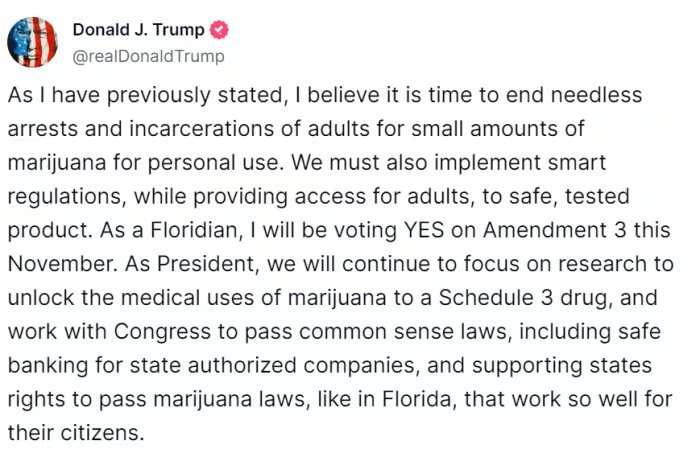Harris Vs. Trump On Marijuana: Where The Presidential Candidates Stand As Voters Head To The Polls
When voters head to the polls next Tuesday, they’ll have a chance to decide between two major party presidential nominees on diametrically opposite sides of the political spectrum, with at least one key exception: They both support legalizing marijuana at some level.
This is a historic first in the U.S., with both Vice President Kamala Harris and former President Donald Trump fundamentally aligned on the need for cannabis reform. That said, there are some nuances to each candidate’s policy position that voters who care about marijuana policy issues may take into account. At a high level, there’s agreement between both tickets that people should not be arrested or jailed over simple marijuana possession.
While the vice president was notably silent on the issue for weeks after earning the Democratic nomination, her pro-legalization stance didn’t come as a surprise. She sponsored a legalization bill during her time in the Senate and voiced support for the reform during a private roundtable with marijuana pardon recipients back in March. She reiterated that position later in her campaign, pledging to make legalization “the law of the land” if she wins the White House.
Trump’s embrace of the Florida cannabis measure—as well as federal rescheduling and marijuana industry banking access—wasn’t quite so predictable. After formalizing his bid for reelection, he largely employed aggressive anti-drug rhetoric, for example voicing support for instituting the death penalty for people who sell illegal substances.
During his time in office, he made limited comments about the issue, tentatively backing legislation to let states set their own policies but taking no administrative steps to codify that policy. In fact, his first attorney general, Jeff Sessions, rescinded Obama-era guidance that urged prosecutorial discretion in federal cannabis enforcement.
Marijuana Under A Harris Or Trump Presidency
As with any election, it’s impossible to know to what extent—if at all—the winning candidate will see through their campaign promises, and marijuana issues are no exception. Also, while both Harris and Trump have backed key policy changes, it’s also the case that the prospects of comprehensive reform under either administration will likely hinge on the composition of Congress.
With Harris, advocates have a longer record to base their decision on. Sponsoring legalization legislation in the Senate and making a commitment to push for an end to federal prohibition if elected arguably gives the Democratic nominee more credentials, compared to the more states-focused reform platform Trump has adopted.But on the flip side, if he were elected and continued to push the issue, some feel that could embolden Republican lawmakers who’ve previously held up cannabis legislation to get in line.
In any case, while voters have a choice next Tuesday between two ideologically disparate candidates on virtually every other key political issue, whomever they choose will have at least given reason to believe that they would not interfere in the ever-expanding marijuana legalization movement. And if they maintain a pro-reform agenda, that movement could ultimately see federal policy change on the horizon.



